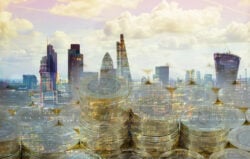They didn’t see it coming. They didn’t know how long it’d last. They apologised for it without changing their policies. And now, the experts can’t agree on what’s causing it. In fact, they might be the cause itself.
Yes, I know you could apply that introduction to all sorts of problems we’re facing. But inflation is suddenly a front-page problem. And I’m not just talking about the financial news, but the tabloids too.
The fascinating part is this: no two experts can agree about what’s going on when it comes to inflation. Which is a mighty familiar state of affairs…
The global financial crisis of 2008 was an interesting time for me. Each day, I would go and attend lectures at university, where we were taught things about financial markets and economies. Then we’d go home and read the news, which would disprove all the things that we had been taught that day.
Now homework and studying is a drag at the best of times. But can you imagine the frustration of learning disproven rubbish? Imagine answering an exam question with a proven and demonstrated lie…
Luckily, I found out about the financial newsletter industry. Each time I was told that “nobody had predicted the global financial crisis,” well, I knew otherwise.
Those who don’t have… misaligned incentives… did see the crisis coming. Sadly, my favourite one of the lot, Kurt Richebächer, died shortly before his predictions came true.
Keen to dispel the rapidly growing disinterest and disillusion of everyone involved in the university’s finance and economics degrees, I invited a newsletter editor to come and give a guest speech. He agreed and hired me a year later, before founding the publisher of Fortune & Freedom.
Anyway, what made the crisis of 2008 so interesting is that, not only did mainstream and governments not see it coming, not only did they misunderstand and misapprehend it, not only did they worsen it, and not only did they fail to respond well to it… they still don’t agree about what actually happened. They cannot explain the underlying events and their causality, even now. At least, they cannot agree on the basics.
They did, however, do a very good job of ignoring and avoiding the explanations and reasoning of those who did predict the crisis. Indeed, one of the reasons we believe the “nobody saw the crisis coming” is that those who did see it coming were never given any recognition for this.
Economics did not learn one crisis at a time. Perhaps it’ll take a few funerals for the field to advance, as they say about real science.
For those who did predict and explain the crisis, some of their beliefs have been adopted. Like the idea of “malinvestment” and the threat of central bankers inflating bubbles. We understand these ideas now.
But still, the entire economics and financial establishment rests on ignoring the economic theories that were vindicated by 2008. They are employed to ignore them, you might say. Because, otherwise, they’d be unemployed given the solutions proposed by those who predicted the crisis, such as abolishing central banks.
Anyway, today, we are in much the same situation over the topic of inflation. The supposedly surprising bout of inflation was indeed predicted by many, including in Fortune & Freedom. But have those who were proven correct been acknowledged by those in positions of policy, who failed to see the inflation coming?
The key giveaway over just how uncertain things are – the same giveaway as that of the pandemic policies – is the vast gaps and differences between the different official narratives and policies.
The best example of this comes from a comparison of the analysis by Bridgewater and the prominent economist Paul Krugman on the same problem – inflation’s cause.
Asset management firm Bridgewater’s research report declares “It’s Mostly a Demand Shock, Not a Supply Shock”. Meanwhile Krugman declared precisely the opposite:
Trying to clarify my own thoughts on inflation. I got inflation wrong; I didn’t see the current surge coming. But why? I didn’t think the fiscal stimulus early this year would boost demand as much as Summers et al predicted … and, in fact, so far it hasn’t
Real final demand (excluding inventories) is up 2.6% over the past two years. That’s well short of normal growth in potential output
What’s happened, however, is that we’ve faced supply constraints, both supply-chain issues in meeting huge demand for durable goods and withdrawal of workers from the labor force, i.e. Great Resignation
In other words, it’s all about disrupted supply, not excess demand.
The underlying theories are simple. Inflation is supposedly a matter of rising prices. But this can occur for two reasons – supply shortages or excess demand.
This is of course incorrect. Rising prices are a measure of inflation, not inflation itself.
Price changes that are caused by demand and supply are not inflation, they are merely evidence of the forces of supply and demand in action.
If there’s an oil shortage, for example, and this raises the oil price, raising the price of many other goods too: that’s not inflation. It’s an oil shortage causing prices to rise.
Nobody would be dumb enough to raise interest rates during an oil shortage… would they?
Inflation, on the other hand, as Nigel Farage likes to say, is a disease of money. Inflation is about the value of money falling, which usually, but not always, has the symptom of rising prices.
Conflating the two issues is a dangerous game because, if central bankers intervene in the economy when prices are rising because of supply or demand issues, and not because of inflation, then they can do a lot of damage.
But, we digress. Let’s get back to the main debate.
Krugman initially focuses on government stimulus and its effect on demand. He says that stimulus did not trigger demand spikes, according to the data. And so the inflation (rising prices) is being caused by supply chain disruption due to Covid.
Implicitly, we should not panic about inflation and it’ll moderate in time. It remains “transitory”.
Bridgewater’s argument is that… well its opening paragraph is a cracker. But first, a quick definition.
“MP3” in the paragraph below refers to central banks financing governments which hand out money directly to people, as opposed to pumping it into the banking system.
Some call this “helicopter money” because of a hypothetical example where the central bank and government literally throw cash out of a helicopter. Covid stimulus took that form, but using internet banking instead of the helicopter. And Bridgewater sees this as a sea change:
Even as supply disruptions and higher inflation persist, markets are discounting that they will soon subside, leaving inflation at central bank targets and allowing for very easy monetary policy for a very long time. We disagree. While the headlines tend to focus on the micro elements of the supply shock (the LA port, coal in China, natural gas in Europe, semiconductors globally, truckers in the UK, etc.), this perspective largely misses the macro cause that is likely to persist and for which there is no idiosyncratic solution. This is not, by and large, a pandemic-related supply problem: as we’ll show, supply of almost everything is at all-time highs. Rather, this is mostly an MP3-driven upward demand shock. And while some drivers of higher inflation have been transitory, we see the underlying demand/supply imbalance getting worse, not better.
So, Bridgewater thinks that helicopter money triggered a demand shock which is overloading supply, especially during the pandemic disruptions. Moreover, it’ll also continue to do so indefinitely.
Now I don’t know who’s right. Maybe both are, although they criticise the other’s logic. And this is only two of many similar arguments.
But the point is this, as the New York Times admits in a different but related context:
Nobody Really Knows How the Economy Works. A Fed Paper Is the Latest Sign.
Many experts are rethinking longstanding core ideas, including the importance of inflation expectations.
But don’t worry, the experts tell us. Inflation is transitory…

Nick Hubble
Editor, Fortune & Freedom




